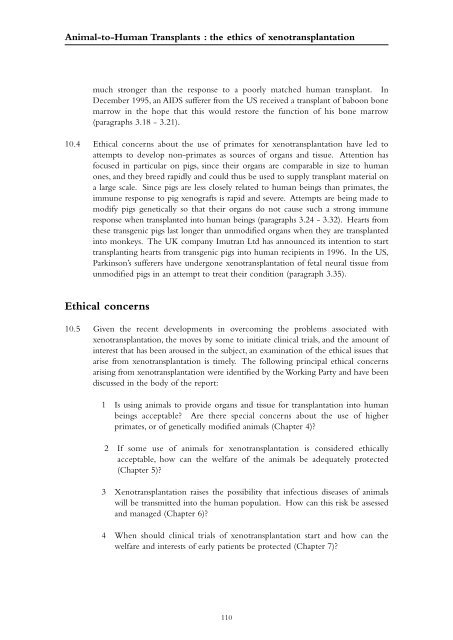Xenotransplantation - Nuffield Council on Bioethics
Xenotransplantation - Nuffield Council on Bioethics
Xenotransplantation - Nuffield Council on Bioethics
You also want an ePaper? Increase the reach of your titles
YUMPU automatically turns print PDFs into web optimized ePapers that Google loves.
Animal-to-Human Transplants : the ethics of xenotransplantati<strong>on</strong><br />
much str<strong>on</strong>ger than the resp<strong>on</strong>se to a poorly matched human transplant. In<br />
December 1995, an AIDS sufferer from the US received a transplant of babo<strong>on</strong> b<strong>on</strong>e<br />
marrow in the hope that this would restore the functi<strong>on</strong> of his b<strong>on</strong>e marrow<br />
(paragraphs 3.18 - 3.21).<br />
10.4 Ethical c<strong>on</strong>cerns about the use of primates for xenotransplantati<strong>on</strong> have led to<br />
attempts to develop n<strong>on</strong>-primates as sources of organs and tissue. Attenti<strong>on</strong> has<br />
focused in particular <strong>on</strong> pigs, since their organs are comparable in size to human<br />
<strong>on</strong>es, and they breed rapidly and could thus be used to supply transplant material <strong>on</strong><br />
a large scale. Since pigs are less closely related to human beings than primates, the<br />
immune resp<strong>on</strong>se to pig xenografts is rapid and severe. Attempts are being made to<br />
modify pigs genetically so that their organs do not cause such a str<strong>on</strong>g immune<br />
resp<strong>on</strong>se when transplanted into human beings (paragraphs 3.24 - 3.32). Hearts from<br />
these transgenic pigs last l<strong>on</strong>ger than unmodified organs when they are transplanted<br />
into m<strong>on</strong>keys. The UK company Imutran Ltd has announced its intenti<strong>on</strong> to start<br />
transplanting hearts from transgenic pigs into human recipients in 1996. In the US,<br />
Parkins<strong>on</strong>’s sufferers have underg<strong>on</strong>e xenotransplantati<strong>on</strong> of fetal neural tissue from<br />
unmodified pigs in an attempt to treat their c<strong>on</strong>diti<strong>on</strong> (paragraph 3.35).<br />
Ethical c<strong>on</strong>cerns<br />
10.5 Given the recent developments in overcoming the problems associated with<br />
xenotransplantati<strong>on</strong>, the moves by some to initiate clinical trials, and the amount of<br />
interest that has been aroused in the subject, an examinati<strong>on</strong> of the ethical issues that<br />
arise from xenotransplantati<strong>on</strong> is timely. The following principal ethical c<strong>on</strong>cerns<br />
arising from xenotransplantati<strong>on</strong> were identified by the Working Party and have been<br />
discussed in the body of the report:<br />
1 Is using animals to provide organs and tissue for transplantati<strong>on</strong> into human<br />
beings acceptable? Are there special c<strong>on</strong>cerns about the use of higher<br />
primates, or of genetically modified animals (Chapter 4)?<br />
2 If some use of animals for xenotransplantati<strong>on</strong> is c<strong>on</strong>sidered ethically<br />
acceptable, how can the welfare of the animals be adequately protected<br />
(Chapter 5)?<br />
3 <str<strong>on</strong>g>Xenotransplantati<strong>on</strong></str<strong>on</strong>g> raises the possibility that infectious diseases of animals<br />
will be transmitted into the human populati<strong>on</strong>. How can this risk be assessed<br />
and managed (Chapter 6)?<br />
4 When should clinical trials of xenotransplantati<strong>on</strong> start and how can the<br />
welfare and interests of early patients be protected (Chapter 7)?<br />
110
















